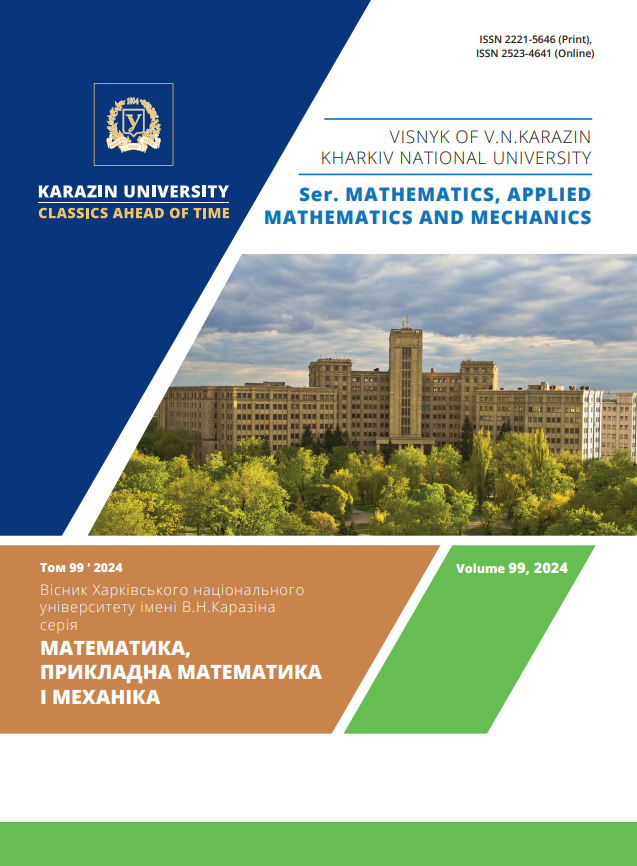Homogeneous approximations of nonlinear control systems with output and weak algebraic equivalence
Abstract
In the paper, we consider nonlinear control systems that are linear with respect to controls with output; vector fields defining the system and the output are supposed to be real analytic. Following the algebraic approach, we consider series $S$ of iterated integrals corresponding to such systems. Iterated integrals form a free associative algebra, and all our constructions use its properties. First, we consider the set of all (formal) functions of such series $f(S)$ and define the set $N_S$ of terms of minimal order for all such functions. We introduce the definition of the maximal graded Lie generated left ideal ${\mathcal J}_S^{\rm max}$ which is orthogonal to the set $N_S$. We describe the relation between this maximal left ideal and the left ideal ${\mathcal J}_S$ generated by the core Lie subalgebra of the system which realizes the series. Namely, we show that ${\mathcal J}_S\subset {\mathcal J}_S^{\rm max}$. In particular, this implies that the graded Lie subalgebra that generates the left ideal ${\mathcal J}_S^{\rm max}$ has a finite codimension. Also, we give the algorithm which reduces the series $S$ to the triangular form and propose the definition of the homogeneous approximation for the series $S$. Namely, homogeneous approximation is a homogeneous series with components that are terms of minimal order in each component of this triangular form. We prove that the set $N_S$ coincides with the set of all shuffle polynomials of components of a homogeneous approximation. Unlike the case when the output is identical, the homogeneous approximation is not completely defined by the ideal ${\mathcal J}_S^{\rm max}$. In order to describe this property, we introduce two different concepts of equivalence of series: algebraic equivalence (when two series have the same homogeneous approximation) and weak algebraic equivalence (when two series have the same maximal left ideal and therefore have the same minimal realizing system). We prove that if two series are algebraically equivalent, then they are weakly algebraically equivalent. The examples show that in general the converse is not true.
Downloads
References
D.M. Andreieva, S.Yu. Ignatovich. Homogeneous approximation for minimal realizations of series of iterated integrals, Visnyk of V.N.Karazin Kharkiv National University, Ser. Mathematics, Applied Mathematics and Mechanics. - 2022. - Vol. 96. - P. 23-39. DOI: https://doi.org/10.26565/2221-5646-2022-96-02
D.M. Andreieva, S.Yu. Ignatovich. Homogeneous approximation of one-dimensional series of iterated integrals and time optimality, Journal of Optimization, Differential Equations and their Applications. - 2023. - Vol. 31, No 2. - P. 1-23. DOI: http://dx.doi.org/10.15421/142308
A. Bellaiche. The tangent space in sub-Riemannian geometry, in: Progress in Mathematics, Bellaiche, A. and Risler, J. J., eds., Birkhauser Basel, 1996. - Vol. 144. - P. 1-78. DOI: http://doi.org/10.1007/978-3-0348-9210-0_1
M. Fliess. Fonctionnelles causales non lineaires et indeterminees non commutatives, Bull. Soc. Math. France. - 1981. - Vol. 109. - P. 3-40.
S. Yu. Ignatovich. Realizable growth vectors of affine control systems, J. Dyn. Control Syst. - 2009. - Vol. 15. - P. 557-585. DOI: http://doi.org/10.1007/s10883-009-9075-y
A. Isidori. Nonlinear control systems. 3-rd ed. Springer-Verlag, London. - 1995. - 549 p. DOI: https://doi.org/10.1007/978-1-84628-615-5
V. Jurdjevic. Geometric control theory. Cambridge University Press. - 1996. - 508 p. DOI: https://doi.org/10.1017/CBO9780511530036
M. Kawski. Combinatorial algebra in controllability and optimal control. In: Algebra and Applications-2: Combinatorial Algebra and Hopf Algebras. A. Makhlouf (Ed.), Hoboken ISTE Ltd. / John Wiley and Sons, 2021. - P. 221-286. ISBN 978-1-119-88091-2
G. Melancon, C. Reutenauer. Lyndon words, free algebras and shuffles, Canad. J. Math. - 1989. - Vol. 41. - P. 577-591. DOI: http://doi.org/10.4153/CJM-1989-025-2
C. Reutenauer. Free Lie algebras. Clarendon Press, Oxford. - 1993. - 286 p.
G. Sklyar, P. Barkhayev, S. Ignatovich, V. Rusakov. Implementation of the algorithm for constructing homogeneous approximations of nonlinear control systems, Mathematics of Control, Signals, and Systems. - 2022. - Vol. 34. - No 4. - P. 883--907. DOI: http://doi.org/10.1007/s00498-022-00330-5
G.M. Sklyar, S.Yu. Ignatovich. Free algebras and noncommutative power series in the analysis of nonlinear control systems: an application to approximation problems, Dissertationes Mathematicae. - 2014. - Vol. 504. - P. 1-88. DOI: http://dx.doi.org/10.4064/dm504-0-1
G. Sklyar, S. Ignatovich. Construction of a homogeneous approximation. In: Advanced, Contemporary Control. Advances in Intelligent Systems and Computing, A. Bartoszewicz, J. Kabzinski, J. Kacprzyk (Eds.), Springer, Cham. - 2020. - Vol. 1196. - P. 611-624. DOI: https://doi.org/10.1007/978-3-030-50936-1_52
G.M. Sklyar, S.Yu. Ignatovich, P.Yu. Barkhayev. Algebraic classification of nonlinear steering problems with constraints on control, in: Advances in Mathematics Research, Nova Science Publishers, Inc.: New York. - 2005. - Vol. 6. - P. 37--96. ISBN 9781594540325.
Citations
Andreieva D. M., Ignatovich S. Yu. & Sklyar G. M. (2025)
Crossref
Copyright (c) 2024 Д. М. Андреєва, С. Ю. Ігнатович

This work is licensed under a Creative Commons Attribution-NonCommercial-NoDerivatives 4.0 International License.
The copyright holder is the author.
Authors who publish with this journal agree to the following terms:
1. Authors retain copyright and grant the journal right of first publication with the work simultaneously licensed under a Creative Commons Attribution License that allows others to share the work with an acknowledgement of the work's authorship and initial publication in this journal. (Attribution-Noncommercial-No Derivative Works licence).
2. Authors are able to enter into separate, additional contractual arrangements for the non-exclusive distribution of the journal's published version of the work (e.g., post it to an institutional repository or publish it in a book), with an acknowledgement of its initial publication in this journal.
3. Authors are permitted and encouraged to post their work online (e.g., in institutional repositories or on their website) prior to and during the submission process, as it can lead to productive exchanges, as well as earlier and greater citation of published work (see The Effect of Open Access).




